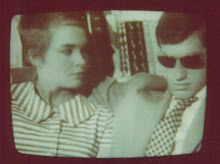Julian Schnabel was a rising art star in the 1980s. His paintings often reference history, culture, and literature. In the 1990s he added films to his art repertoire. During the last fifteen years he made Basquiat, Before Night Falls, Diving Bell and Butterfly leading up to this latest journey. Each film shows a person struggling through adversity.
This time, he visits the wartorn border areas joining Palestine and Israel, a controversial film about a conflict that continues today.
The story begins in 1947 when Hind al-Husseini uses her wealth to feed and educate orphaned children. The film takes us to the aftermath of the Six-Day War in 1967 when Israeli military occupied areas of Palestine--the West Bank, Gaza Strip, Golan Heights, and East Jerusalem.
We learn about a young teen named Nadia who runs away from a home where she has been repeatedly raped by a caretaker. She lands into a life as an exotic dancer and heavy drinking. She eventually lands in jail for an assault charge. She meets a nurse named Fatima, who was serving 2 life sentences after becoming involved with terrorists. She entered a movie theater showing the Roman Polanski film, Repulsion--leaves a bag with a bomb in a bag on the floor.
Fatima arranges a marriage for Nadia with her brother upon her release from jail. He provides a good life and truly loves her. In 1973 Nadia gives birth to daughter, Miral. This is her story.
Nadia remains troubled. She goes out at night, leaving Miral under the care of her father, a kid a loving man. Nadia ends her life by walking out into the sea. Miral is taken to Hind's orphanage school to live during the week while he is at work.
In 1987 when Miral (Frieda Pinto) is a teen during the "infitada," when poor Palestinian workers were run over by a convoy. Several of Hind's girls, including Miral, are sent to teach the orphaned children in a refugee camp. She becomes politicized there when she encounters a radical group and her first boyfriend. This leads her to be captured and tortured for information at age 17.
Her father fears for her, desperate to save her from the troubled lives of his sister and her mother. He manages to have her released. Soon after this time, he reveals to Miral that she is not his biological child.
Miral befriends an Israeli girl named Lisa (Stella Scnabel) and is exposed to new ideas. She suffers the loss of her boyfriend and father. Grieving and uncertain about the future, she visits Hind once more. An old woman by this time, Hind is proud of Miral's convictions--encourages her to pursue further education. Miral wishes to become a journalist.
The film ends with mention of The Oslo Agreement in 1993, a plan for two independent states that has never been honored. Miral does go on to become a journalist and writer of her own story.
This is a complex political biopic that has been received with mixed reviews. I do not have strong views about the Israeli-Palestine conflict so I could watch it as a beautiful story. The cinematography is very good. The screenply was written by Rulla Jebreal, based her novel of true events in her life. Julian Schnabel apparently had a close relationship with her so there is an authenticity to the entire experience that is hard to deny. The soundtrack includes several pieces by composer, Laurie Anderson.
Another gorgeous art film.
DVD extras show Schnabel in his studio with the many paintings he has made of Miral, who he refers to as his muse. Schnabel speaks about how his process of doing painting and film informs what he gets in the end. I appreciate this way of working. In another extra about making the movie, he tells his camerman "follow your bliss."
He claims that Jebreal's book changed his life. When critics accused him of being anti-semetic, he nearly bought back the movie, but he explains that a shift in public opinion occurred. Still, the film opened in just 10 markets. Schnabel adds that is important to make a movie about what is happening now. That moment in 1993 when an agreement was made offered enormous hope to many people, but the hope is now stopped due to not enough progress.
7/22/11
Subscribe to:
Post Comments (Atom)





No comments:
Post a Comment